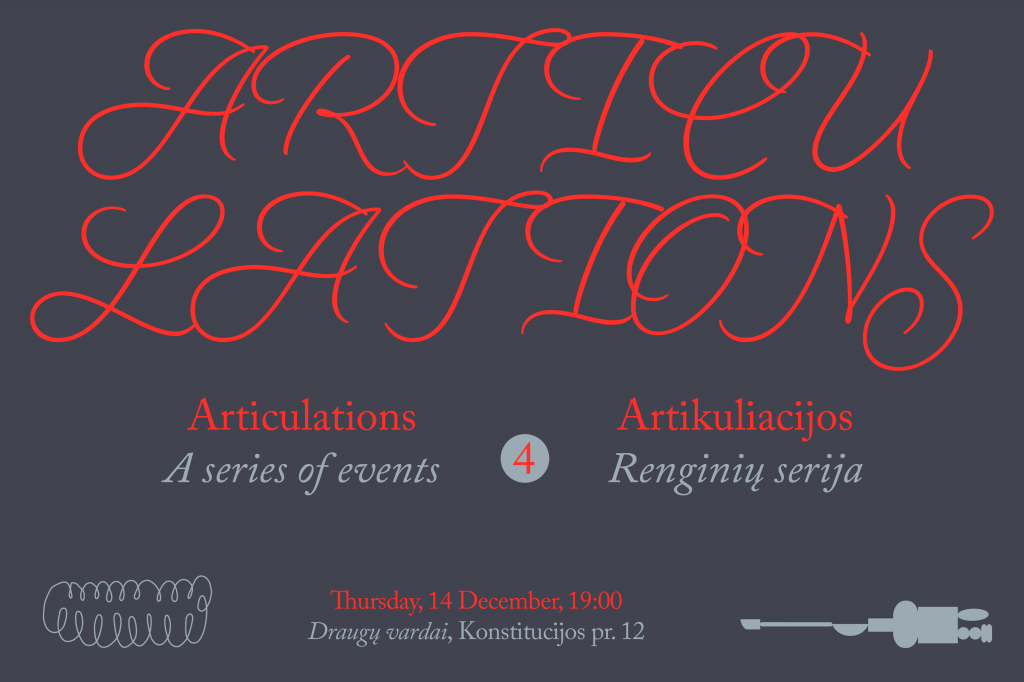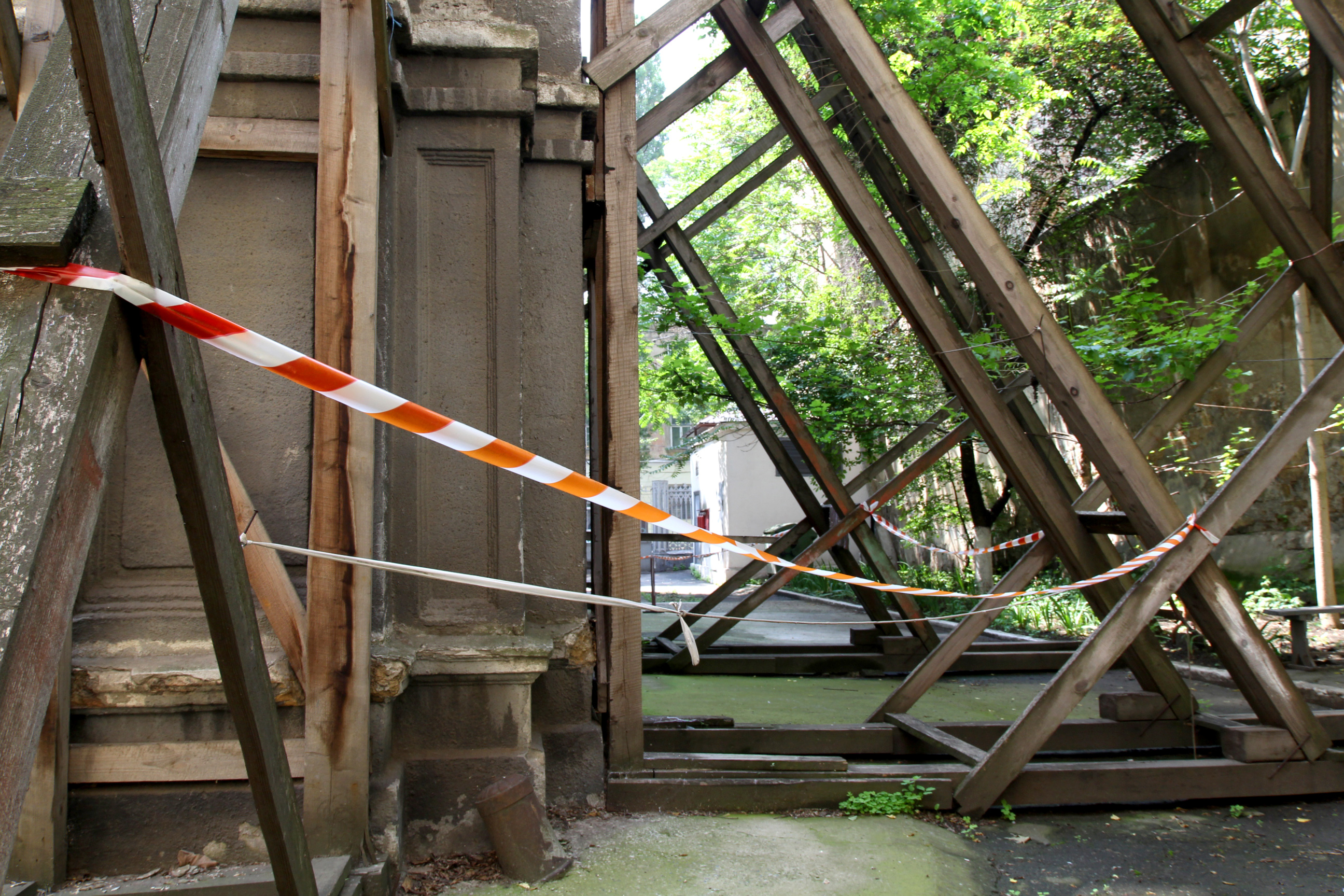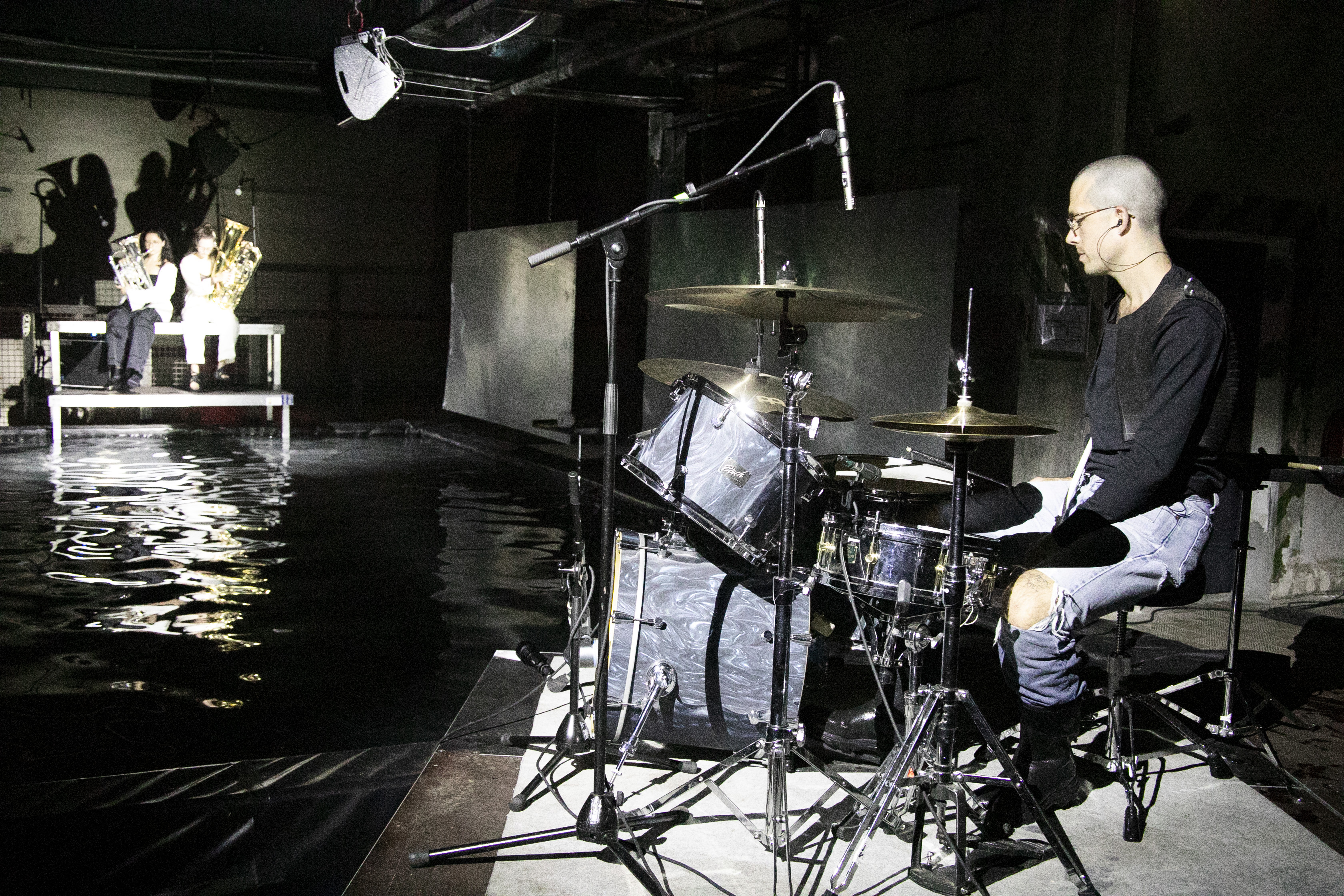The winter edition of ‘Articulations’ invites you to listen

Date: Thursday, 14 December, 19:00
Location: Draugų vardai (Konstitucijos av. 12, Vilnius)
Participants: Kandis Friesen, Saverio Cantoni, Billy Bultheel
The event will be held in English. Lithuanian sign language interpretation will be available for the Deaf and those with hearing loss.
Rupert, a centre for art, residencies and education, invites you to embark on a sonic journey ahead of the year’s big holidays and say goodbye until next year with its events.
Articulations for the fourth time this year will introduce Rupert residents and their artistic practices. This time we ask – do we limit our senses by prioritising visual information? When we close our eyes, is there more to touch and comprehend?
The winter edition of Articulations looks inward. This fourth assembly of the year consists of two movements and a coda, analysing aural perception and meaning.
The first movement is a listening circle, built around two interventions from current resident artists Saverio Cantoni and Kandis Friesen. Saverio will present their work What do you hear in a seashell?*, part of their extensive body of work challenging what is physically signified by listening. Next, Kandis will layer audiovisual excerpts of their long-running research project The Choral Synagogue, examining how one Odessa building’s precarious state conveys the city’s complex histories. This part concludes with a brief conversation with residency curator JL Murtaugh and the artists on sound innovation and the purpose of audio in creative practice.
The second movement features Rupert’s newly invited resident Billy Bultheel, who presents portions of two recent performance commissions. Billy will speak with the Alternative Education Programme‘s curator, Tautvydas Urbelis, on how sonic performance elements can create meaning visuals cannot achieve alone.
A question and answer session with the artists and moderators operates as the event’s coda, leading into DJ set selected by Draugų vardai, seasonal drinks, and conversation.
* This work was produced with the financial assistance of the European Union. The views expressed herein can in no way be taken to reflect the official opinion of the European Union.
ABOUT THE ARTISTS:
Kandis Friesen works with the dispersed monumental. Drawing on diasporic language and geographies, her compositions build from architectural, material, and spectral inhabitations of exile, amplifying minute and myriad histories at once.
Her work has been shown at Galerie im Turm (Berlin DE), the Chicago Architecture Biennial (Zhigaagong / Chicago US), Künstlerhaus Bethanien (Berlin DE), Plug In ICA (Winnipeg, Treaty 1 territory, CA), Festival International du Film sur l’Art (Tiohtià:ke / Mooniyang / Montreal CA), MIX NYC (Brooklyn, Lenapehoking territory, US), Athens Digital Arts Festival (Athens GR), and Jihlava International Film Festival (Jihlava CZ).
Scheduled for the fall of 2022, her site-specific exhibition with the Museum of Odessa Modern Art is on hold due to the war. Centred on the city’s muted histories and their structures of transmission, she is developing the work while in residence at Rupert as a displaced exhibition until it can return to the city of Odessa.
Friesen lives and works in Berlin and Tiohtià:ke / Mooniyang / Montréal.
 From the cycle The Silentists Are Striking, Vol. 1. Photo by Kandis Friesen
From the cycle The Silentists Are Striking, Vol. 1. Photo by Kandis Friesen
Saverio Cantoni is a white, masculine-presenting cyborg, disabled artist based in Berlin.
They build imagined accessible worlds, working with several media comprising sound, moving images, installation, and textiles. Their work is often activated by sharing foods or actively involving the audience. Lately, they are questioning the normative understanding of sensory information, working on sonic spaces that are not made to be just audible.
Saverio’s work is informed by queer theory and crip theory, and they embrace tentacular thinking. During their one-month residency at Rupert, Saverio will continue their research challenging normative understanding of sound perception, with a focus on a sound performance challenging audism.

Billy Bultheel lives and works in Berlin and Brussels. Their work as an composer and performance artist is often site-specific, bridging contemporary electronic techniques with the traditions of European Medieval and Renaissance polyphonic music. Billy’s dark, melancholic compositions layer noise, ambient metal, and experimental orchestration.
Bultheel’s recent projects include presentations with Atonal (Berlin DE), with James Richards at WIELS (Brussels BE), Bourse de Commerce (Paris FR), Athens Biennial 7, and Schinkel Pavillon (Berlin DE). They formed the band 33 with Alexander Iezzi in 2020. Since 2012, Bultheel has collaborated with artist Anne Imhof as a performer and composer in performances, films, and installations.
Bultheel studied composition at the Institute of Sonology in The Hague, Holland and performance and choreography at the Institute for applied theatre science, Gießen, Germany.
 The Thief’s Journal, curation by Marie-Therese Bruglacher, scenography by Andrea Belosi, Atonal 2023. Photo by Spyros Rennt
The Thief’s Journal, curation by Marie-Therese Bruglacher, scenography by Andrea Belosi, Atonal 2023. Photo by Spyros Rennt
ARTICULATIONS is the joint initiative of Rupert, a centre for art, residencies and education, and Autarkia, an artist daycare centre. This cycle of seasonal public events provides opportunities to informally meet Rupert’s artists-in-residence and discover their work.
– – – –
Curator of the fourth event: JL Murtaugh
Coordinators: Rugilė Miliukaitė and Povilas Gumbis
Communication: Karolina Augevičiūtė
Graphic design: Jonė Miškinytė
Editor: Evelina Zenkutė (LT)
Sound: Antanas Dombrovskij
Sign language interpreter: Anželika Teresė
Rupert is financed by the Lithuanian Council for Culture and sponsored by Vilnius City Municipality, Nordic Culture Point, Tech Zity
Rupert’s activities are financed by the Lithuanian Council for Culture and European Union. This event is part of New Perspectives for Action. A project by Re-Imagine Europe, co-funded by the European Union.
Views and opinions expressed are however those of the author(s) only and do not necessarily reflect those of the European Union or the European Education and Culture Executive Agency (EACEA). Neither the European Union nor EACEAcan be held responsible for them.
Special thanks to Tautvydas Urbelis, Antanas Gerlikas, Kotryna Butautytė